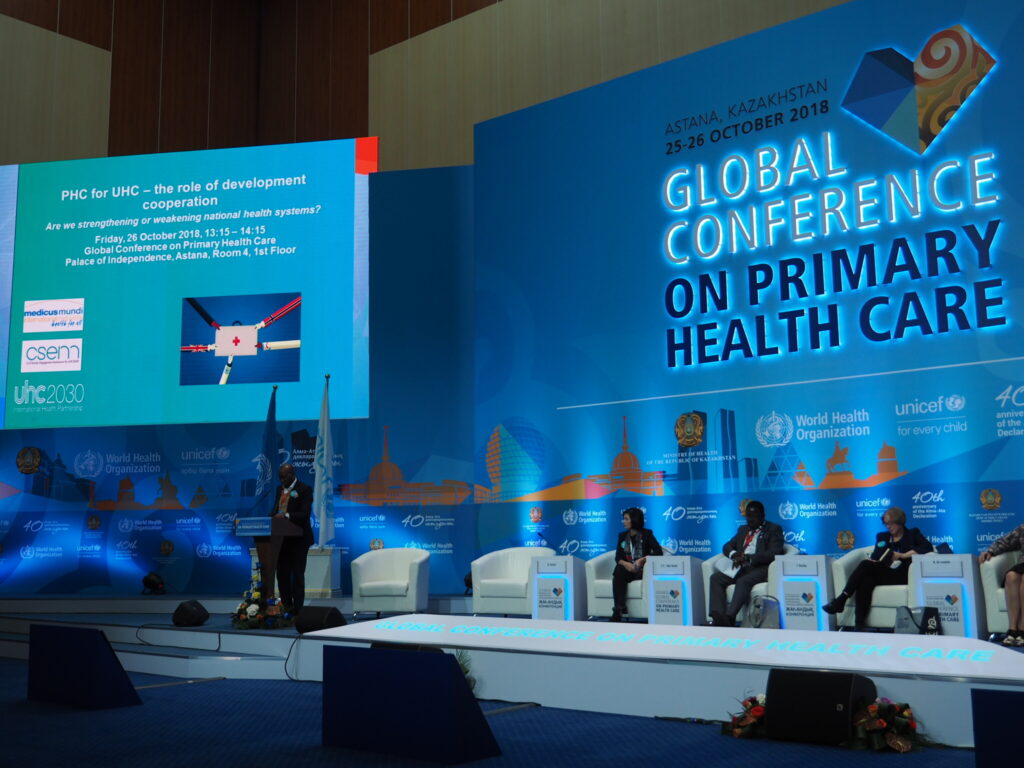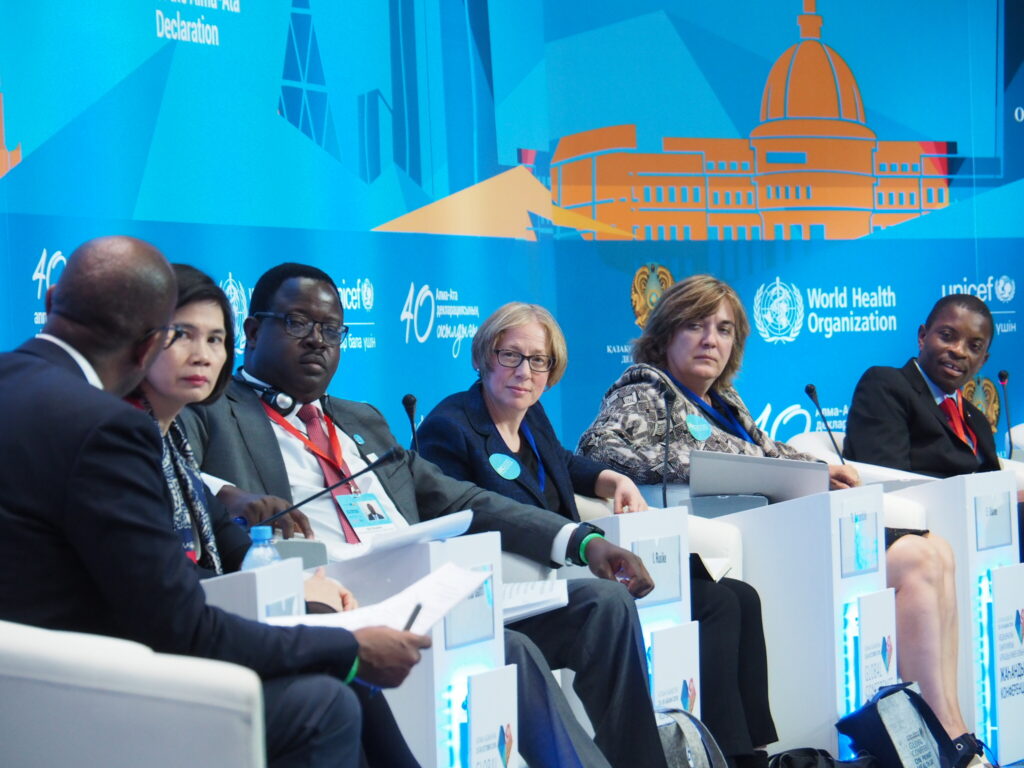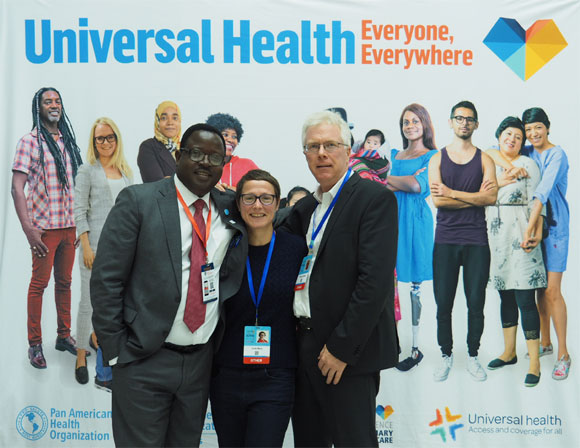 The aim of the Global Conference on Primary Health Care was to celebrate the 40th Anniversary of the Declaration of Alma-Ata (1978) and to renew a commitment to Primary Health Care “to achieve universal health coverage and the Sustainable Development Goals”.
The aim of the Global Conference on Primary Health Care was to celebrate the 40th Anniversary of the Declaration of Alma-Ata (1978) and to renew a commitment to Primary Health Care “to achieve universal health coverage and the Sustainable Development Goals”.
The Declaration of Astana, unanimously endorsed by all WHO Member States on the first day of the Conference and published afterwards, makes pledges in four key areas: (1) make bold political choices for health across all sectors; (2) build sustainable primary health care; (3) empower individuals and communities; and (4) align stakeholder support to national policies, strategies and plans.
The following personal report is written by Thomas Schwarz, Executive Secretary of the MMI Network, who participated in the Astana Conference as part of the delegation of the Medicus Mundi International Network.
See also his two other Astana blogs:
- Looking back at the Alma-Ata Jubilee conference (2/3): Official side event on “International cooperation and strengthening or weakening national health policies and systems”
- Looking back at the Alma-Ata Jubilee conference (3/3): Civil society café session on “Calling for a New Global Economic Order – the forgotten element of the Alma-Ata Declaration”
Celebrating …what?

What a difference to the black and white photographs of the 1978 Alma-Ata International Conference on Primary Health Care: The Global Conference on Primary Health Care, edition 2018, took place in the hypermodern new capital of Kazakhstan, in the great Independence Palace, with colourful opening and closing shows (the latter ending with singing “We are the World”), with a night at the Astana Opera and a reception by the Mayor of the city…
Sometimes it was difficult for us to find the core of the conference behind all these colours, all the show. And, at least after the first plenaries where a row of Ministers was invited to deliver rather trivial statements and the new Astana Declaration was adopted without even presenting it nor having published it in advance, things seemed to turn bad.
We remembered our own Alma-Ata Jubilee workshop in May, when we started the meeting by READING loud the Alma-Ata Declaration of 1978 and then immediately went into a thorough review of how to translate some of its key content into the present and future. We missed the political dimension, the honest debate. We also missed a new vision of PHC beyond the mainstream UHC rhetoric.
But then, no, the conference took up both speed and depth, with a series of plenaries and parallel sessions. With sincere debate and deepened analysis. With a clearer perspective that people and communities need to be invited back to the centre of policies. With a feeling that participants from various backgrounds rediscovered and understood the holistic and political core of Primary Health Care and started to honestly reflect about how it can be translated into the present and future to make a difference in dealing with national and global health issues across the sectors and silos.
As many things took place in parallel, it was impossible to get an overall picture of the conference. So, at the end of the day(s), it is some highlights, some talks that we will remember, such as:
- The compelling statement by teenage HIV/AIDS activist Yana Panfilova (a “Teenergizer”) in the initial plenary. Watch it here (1st plenary, time 1:27:30)
- Our own civil society “café session” calling for a New International Economic Order (see our separate report on this session – but feel free to already watch the session video)
- The Ministerial parallel session on equity (“Leaving no one behind through PHC), with a great David Sanders (People’s Health Movement). Watch it here (select Ministerial Parallel Sessions and scroll down)
- The power, commitment and leadership of PAHO Director Carissa F. Etienne in the final plenary – she “rocked the room”. Read her remarkable statement.
- The statement of MMI delegate Itai Rusike as civil society representative in the final plenary. Watch it here (6th plenary, time 41:15)
- Unfortunately not theAstana Declaration itself (after finally being able to read it, and after having read it twice, we see more confusion than vision in it)
Civil society contributions to the Jubilee of the Alma-Ata Declaration and the Astana Conference

The Global Primary Health Conference was organized by/for WHO and UNICEF, the Health Ministry of Astana and the WHO member states. The outline of the Astana conference, and the fact that it was “by invitation only”, made it quite difficult for so-called “non-state actors” besides international youth organizations (they had their own pre-conference and visibility throughout the conference) to attend it, to contribute to it in a meaningful way and to be heard by the participants – and beyond Astana. The good news is that this setting rather excluded the usual private sector lobbyists from the center stage, and this contributed strongly to the honesty and depth of the conversation. The bad news was that also the space for civil society was limited.
We reported about the civil society café session on “Calling for a New Global Economic Order – the forgotten element of the Alma-Ata Declaration” organized by the MMI Network together with some civil society colleagues in a separate blog. But already the fact that civil society contributions had to be organized as “café sessions”, squeezed between the formal sessions and competing with food intake and other basic needs, speaks for itself. In the plenaries and official sessions, civil society had a rather hard stay (but nevertheless resulted in some remarkable contributions), and the distinction between real and token “civil society representation” in the conference was not always evident.
What “civil society” was there? Well, once more, not “the people”, and not “the communities” the Alma-Ata Declaration refers to. But the lucky ones. The ones who were invited as NGOs in official relations with WHO having a particular track record in the field of promoting PHC, such as the MMI Network. The ones who successfully submitted a proposal for a “café session”. And before you even started to consider going for a conference ticket, you needed to be sure that you had the financial means to travel to Astana, as no travel support was provided. All in all, representation of civil society in such places remains an issue.
Being aware of this, there were some attempts of civil society networks to celebrate the Alma-Ata jubilee and contribute to the revitalized conversation on Primary Health Care independently from their (physical) participation in the Astana Conference.
A civil society workshop “40 Years of Alma-Ata: Translating ‘Health for All’ into the Present and Future” took place in May ahead of the World Health Assembly and was organized by a working group of the Geneva Global Health Hub co-led by the MMI Network.
In this full-day workshop, participants critically revisited the Alma-Ata Declaration and the core principles expressed in it (in particular: addressing determinants of health; global solidarity for health equity; accountability to the people and communities, access to comprehensive health care services for all through a system structured around the principles of Comprehensive Primary Health Care) for its potential to be used as inspiration and guidance in our quest for Health for All. A remarkable day, resulting in a remarkable statement.
A “Civil Society Primary Health Care Statement” and a series of blogs were published during the Astana conference by the Civil Society Engagement Mechanism of UHC2030 (CSEM), the civil society network closest to the conference organizers.
According to the CSEM Secretariat, they received and integrated feedback from “hundreds of individuals from various CSOs worldwide” into the statement …that finally comes along rather traditionally and not really powerful, but with the usual calls to governments and “development partners” (we frankly admit being biased, preferring, in any case, the “original”).
We agree with CSEM that “shaping a common position among a diverse group of civil society actors, particularly those that do not have a shared history, is a complex process. Thus, rather than this being viewed as an expression of a final position among a well-established community, let it serve as an expression of a community and mindset that is in the process of becoming.”
The uneasiness of some civil society organizations with both the draft Astana Declaration (as known in August) and the draft CSEM “Civil Society Statement” (see above) led the People’s Health Movement to drafting an “Alternative Civil Society Astana Statement on Primary Health Care”.
In a nice intellectual and political exercise, the main part of this alternative statement consists of “rewriting” the 1978 Alma-Declaration, sentence by sentence, and paragraph by paragraph: Therefore, according to PHM, “the statement is a re-affirmation of the Alma Ata declaration, which to PHM and others remains the ultimate declaration on primary health care; the principles are clear and remain relevant. This statement can be seen as a re-commitment to the Alma Ata declaration of 1978: a number of points have been drawn out from the Alma Ata Declaration; with a few additions relevant to the current context and challenges. Although the title has changed, the content remains the same.”
Alternative civil society statement: here
Medicus Mundi International endorsed both “civil society statements” – as many other organizations did. The lack of unity and difficult communication within the so-called civil society is nevertheless worrying in times of easy global communication. In 1978, in Alma-Ata, all participants agreed and supported the conference declaration, and it was a great one. 40 years later we have one official Astana conference declaration and two competing civil society ones. Up to you to come to a conclusion how this looks like…
Thomas Schwarz
1 November 2018
MMI Network at the Astana Conference

The Medicus Mundi International Network, an NGO in official relations with WHO, was invited to the conference and attended it with a small delegation, as part of the civil society constituency. Ahead of the conference, we explored with civil society colleagues about how to guarantee civil society representation in the conference and how to broaden the space for civil society in the formal conference programme. And we approached the secretariat of UHC2030 in order to set up a joint proposal for a side event on international health cooperation.
Both tasks could be successfully accomplished: The MMI Network contributed to this powerful jubilee conference of the 1978 Alma-Ata Declaration with side events focusing on two elements that are at the heart of our engagement in the field of global health, but rather underrepresented in the conference programme:
- Official side event on “International cooperation and strengthening or weakening national health policies and systems”
- Café session on “Calling for a New Global Economic Order – the forgotten element of the Alma-Ata Declaration”
We were also happy to see the head of the MMI delegation, Itai Rusike from the Community Working Group on Health, Zimbabwe, representing civil society in the final plenary of the Conference.
